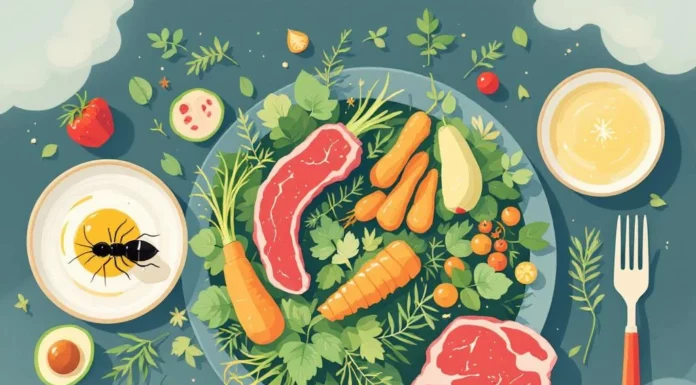Food-Protein-Health: A Necessary Transformation
With a constantly increasing global population, the demand for protein continues to grow. According to the FAO, traditional meat production accounts for nearly 14.5% of global greenhouse gas emissions. This reality pushes us to explore more sustainable alternatives. Insect farming, for example, requires far fewer resources than traditional farming, while providing a source rich in essential nutrients. Crickets and mealworms are already considered staple foods in various cultures around the world. Meanwhile, lab-grown meat, although still in the development phase, promises to significantly reduce the carbon footprint of the agri-food industry. However, the cost of production remains a major obstacle to its widespread adoption.
The rise of ultra-processed plant proteins, such as those developed by Beyond Meat and Impossible Foods, has also marked a turning point in our eating habits. These products, designed to mimic the taste and texture of meat, have received a mixed reception, particularly due to their complex manufacturing process. But the positive environmental impact of these innovations cannot be ignored.
Protein Alternatives: Challenges and Opportunities
Cultural acceptability and regulatory challenges represent significant obstacles for these new sources of protein. Insects, although efficient from an ecological standpoint, encounter cultural resistance, especially in the West. Cultured meat, on the other hand, must overcome complex regulatory hurdles before it can be marketed on a large scale. European startups are heavily investing in these technologies, hoping to overcome these challenges and initiate a transition towards more sustainable food.
Plant proteins, although more accepted, raise questions about their degree of ultra-processing. Health-conscious consumers are questioning the long-term impacts of these products on their well-being. Thus, the challenge is to find a balance between technological innovation and preservation of nutritional values.
Innovation and Health: A Necessary Reconciliation
The potential health risks associated with these new proteins must be rigorously evaluated. Insects, despite their nutritional richness, require strict production standards to avoid any contamination. Ultra-processed plant proteins, although attractive, must guarantee a healthy composition so as not to compromise our health.
Towards Sustainable and Local Food
In the face of concerns related to ultra-processing and regulatory issues, a return to territorial food models emerges as a viable solution. The relocation of food production and consumption based on seasonality can reduce our ecological footprint. Local initiatives and short supply chains, by promoting fresh and seasonal products, offer a sustainable alternative to industrial proteins.
In conclusion, the future of our food depends on a combination of these different approaches. Technological innovation must be accompanied by ecological awareness and respect for local culinary traditions. The transition to alternative proteins is inevitable, but it must be done with respect for our health and our planet.
Sources
– https://www.fao.org/edible-insects/en/ – Fao.org
– https://gfi.org/resource/cultivated-meat-state-of-the-industry/ – External Source
– https://www.nature.com/articles/s41586-023-05822-x – External Source
Sources
https://www.fao.org/edible-insects/en/
https://gfi.org/resource/cultivated-meat-state-of-the-industry/
https://www.nature.com/articles/s41586-023-05822-x
https://www.fao.org/edible-insects/en/
https://gfi.org/resource/cultivated-meat-state-of-the-industry/
https://www.nature.com/articles/s41586-023-05822-x



